 Petzlover
Petzlover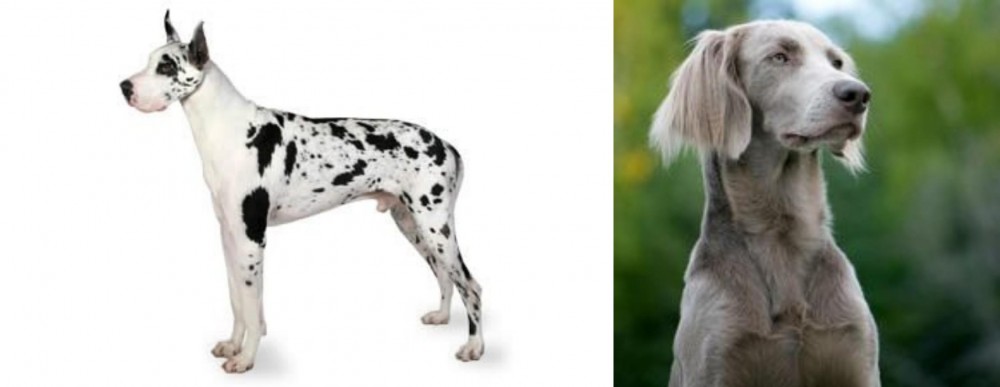 Both Great Dane and Longhaired Weimaraner are originated from Germany. Great Dane may grow 16 cm / 7 inches higher than Longhaired Weimaraner. Great Dane may weigh 50 kg / 111 pounds more than Longhaired Weimaraner. Both Great Dane and Longhaired Weimaraner has almost same life span. Great Dane may have more litter size than Longhaired Weimaraner. Great Dane requires Low Maintenance. But Longhaired Weimaraner requires Moderate Maintenance
Both Great Dane and Longhaired Weimaraner are originated from Germany. Great Dane may grow 16 cm / 7 inches higher than Longhaired Weimaraner. Great Dane may weigh 50 kg / 111 pounds more than Longhaired Weimaraner. Both Great Dane and Longhaired Weimaraner has almost same life span. Great Dane may have more litter size than Longhaired Weimaraner. Great Dane requires Low Maintenance. But Longhaired Weimaraner requires Moderate Maintenance
 Known as the Deutsche Dogge or Apollo of dogs, the giant-breed Great Dane hails from Germany and not Denmark as many people believe.
Known as the Deutsche Dogge or Apollo of dogs, the giant-breed Great Dane hails from Germany and not Denmark as many people believe.
The large Great Dane has been around for about 400 years already. They descend from mastiff-like dogs, being needed to protect country estates.
In the 18th century, apart from watching over estates, they were also popular with the upper class for sport.
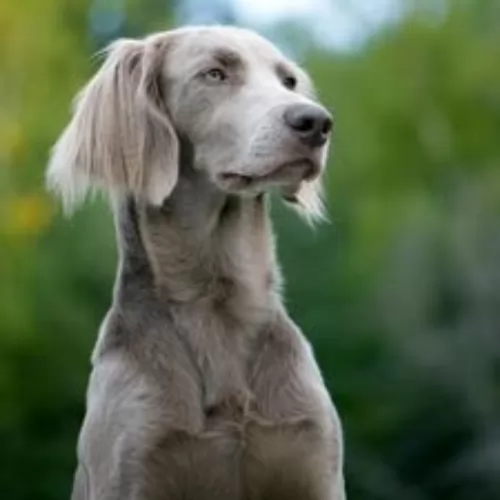 You may be used to the sleek, silver shorthaired Weimaraner, but did you know you get a beautiful long haired version too? Known also as the Long Coated Weimaraner or the ‘Gray Ghost’, with its mesmerising amber eyes, the less common long haired variety shares a similar history as the more familiar short haired version.
You may be used to the sleek, silver shorthaired Weimaraner, but did you know you get a beautiful long haired version too? Known also as the Long Coated Weimaraner or the ‘Gray Ghost’, with its mesmerising amber eyes, the less common long haired variety shares a similar history as the more familiar short haired version.
The dog originates in Germany and was developed to be a hunting dog. It is believed that the silver dog dates back to the early 1800’s, and in 1897 the first breed club in Germany was formed to protect the future of this dog.
The longhair coat is recognized in all countries except the American Kennel Club.
 The Great Dame is a tall, lean, athletic, muscular, elegant looking dog. He can stand anything between 76–86cm in height and weigh around 54–90kg. The large head is long and narrow, and the medium sized floppy ears can be left or they can be cropped.
The Great Dame is a tall, lean, athletic, muscular, elegant looking dog. He can stand anything between 76–86cm in height and weigh around 54–90kg. The large head is long and narrow, and the medium sized floppy ears can be left or they can be cropped.
The tail is long and held low. The coat is short and smooth and can be in several colors such as fawn, black or brindle.
Any kind of aggressiveness was bred out of the Great Dane and today he is a gentle giant of a dog, getting on well with other dogs, children and everyone in his human family.
Even though he is a gentle giant, he will still require training and socialization just because of his size. Then they become the devoted pet that they are so well known to be. You'll want to know that when he comes indoors, he will obey you when you tell him to lie-down, sit or come, otherwise his sheer size will see him knocking things accidentally off table-tops.
He is an intelligent dog and is eager to please so he'll learn easily. He craves human companionship, so make sure that your social Dane has plenty of interaction with you.
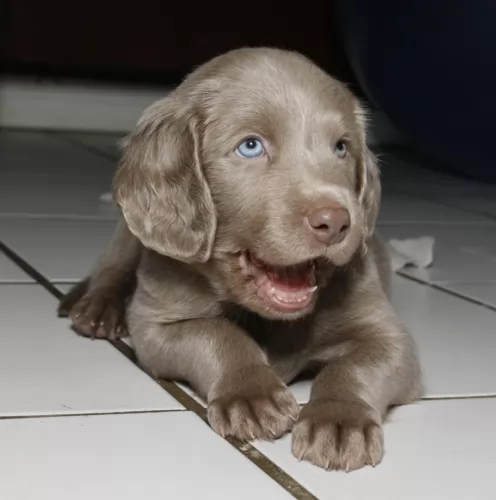 The Longhair Weimaraner with its eye-catching grey coat is a large dog that stands between 58 and 70cm and weighs between 25 to 40kg.
The Longhair Weimaraner with its eye-catching grey coat is a large dog that stands between 58 and 70cm and weighs between 25 to 40kg.
These dogs, unlike the short haired version, have the tail traditionally long and the tail is feathered. The eyes are a blue-green, amber or grey color. The grey coat is soft and silky and even though it is quite long, a brush twice a week will keep it in tip-top condition.
The Longhaired Weimaraner’s temperament is the same as the short haired variety. He is also a superb field dog with excellent hunting skills.
They’re very active dogs, looking for plenty of mental and physical stimulation. For first-time dog owners, this might prove to be too demanding, so the long haired Weimaraner might not be the best first-choice dog to get.
They can be aggressive when meeting new people and he will certainly require training and socialization if you want him to be calm and obedient.
 The Great Dane is a large breed, bred to hunt wild boar. The intelligence, bravery and fearless nature of the dog meant that he was sought after for this task.
The Great Dane is a large breed, bred to hunt wild boar. The intelligence, bravery and fearless nature of the dog meant that he was sought after for this task.
Known as the Apollo of Dogs, you won’t find the Great Dane being used for hunting purposes anymore, being more suited as a companion dog.
While developed as a working breed, today he is a well balanced, intelligent, calm, loving, social, dependable dog that just wants to be loved by his human family and to provide love, loyalty and companionship back in return.
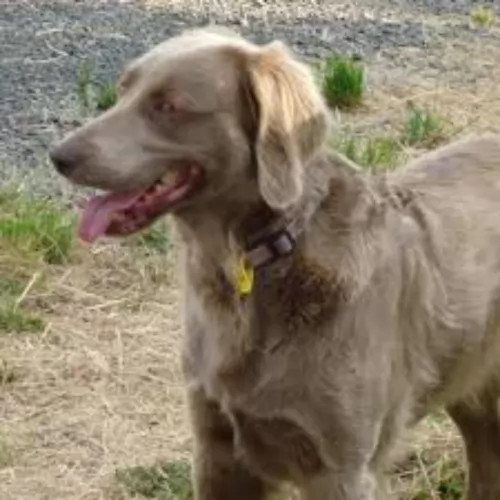 Your Long Haired Weimaraner is a friendly, alert dog that makes for an excellent companion and watchdog. The fact that he is also restless, confident, independent and strong-willed means that training and socialization will be necessary to make him pleasant and obedient.
Your Long Haired Weimaraner is a friendly, alert dog that makes for an excellent companion and watchdog. The fact that he is also restless, confident, independent and strong-willed means that training and socialization will be necessary to make him pleasant and obedient.
You can’t always count on him to be amicable as he also has a bit of an aggressive side.
The way your Long Haired Weimaraner turns out will depend on heredity, the personality of the owner as well as training and socialization.
These dogs want to be with their human family and will follow the owner around and contentedly lie at their feet. Once he's trained, the Weimaraner is guaranteed to make you a fine family companion.
 Typically of giant dogs, the Great Dane doesn't have a particularly long life-span and will live to be about 8 to 10 years of age. Also, giant-breed dogs like this are susceptible to what is known as bloat.
Typically of giant dogs, the Great Dane doesn't have a particularly long life-span and will live to be about 8 to 10 years of age. Also, giant-breed dogs like this are susceptible to what is known as bloat.
You'll notice it because there is swelling of the stomach with gas buildup and also twisting of the stomach. It's a life-threatening condition and you'll need to get your dog to the vet as soon as possible. You can combat it by feeding him smaller, more frequent meals and perhaps buying a slow-feeder dish, forcing your hungry pet to eat slower and not gulp his food down.
Also, large dogs like this can develop hip dysplasia and with a dog like the Great Dane, it takes a while for the bones and joints to grow and then become stable. That is why it is important not to make him do any vigorous exercise till he is at least 18 months of age, as these exercises can put a lot of stress on the joints and bones which can lead to hip dysplasia later on.
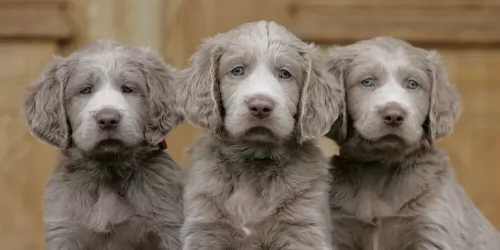 Hip Dysplasia is a medical threat to all dog breeds and fortunately the Weimaraner is a dog breed that has a low rate of dysplasia. When buying a Long Haired Weimaraner, try and get one from breeders who have had their breeding dogs hip-tested.
Hip Dysplasia is a medical threat to all dog breeds and fortunately the Weimaraner is a dog breed that has a low rate of dysplasia. When buying a Long Haired Weimaraner, try and get one from breeders who have had their breeding dogs hip-tested.
You’ll notice that the Weimaraner is a deep-chested dog and he is prone to bloating, which can turn out to be life threatening for your dog if not treated immediately.
The stomach twists and is swollen with no bowel movements. The dog is restless and in distress and needs immediate attention. To help, instead of giving one large meal which is gobbled up quickly, give him 2 smaller meals.
Skin allergies are also quite common in these dogs and you don’t want your silver dogs coat going off as it is his crowning glory.
If he is scratching, his skin is dry, red and itchy, get him to the vet as it can even be parasites at work, causing an allergic reaction.
 This is a large dog so you’ll notice that with commercially manufactured dog foods, there are those made specially for large- or giant breeds. It is important to choose the right dog food for his large size so that you can be sure he gets the right amount of nutrients in for him to grow strong and healthy.
This is a large dog so you’ll notice that with commercially manufactured dog foods, there are those made specially for large- or giant breeds. It is important to choose the right dog food for his large size so that you can be sure he gets the right amount of nutrients in for him to grow strong and healthy.
If you aren't sure about what food would most benefit your Great Dane, ask your vet. While it is important to also feed him quality home-made food and raw meat, when buying kibble for him,check the label of the food you buy him and make sure that the concentration of protein isn’t more than 23 to 25%.
Remember to provide him with a constant supply of fresh, cool water.
Brush your Great Dane’s coat at least twice a week. He has a short, smooth coat so it will be easy, and the brushing will keep his coat soft and shiny. Use this time to also check for fleas and ticks or lumps. You will also need to check his nails and trim them if they don’t trim down on their own.
Your Great Dane will need to be exercised every day if you want him to maintain his lean, muscular shape. It keeps him happy too. He isn’t the kind of dog though that you want to turn into your running partner when you go jogging or cycling. He can go on a walk and play in the garden, but the exercising shouldn’t be for long periods of time.
Every puppy needs to get to the vet for his first check-up when he is 6 weeks of age, and your Dane will also have to. As a puppy he will need to be de-wormed which will happen with this 6 week check up. He will also be vaccinated for distemper.
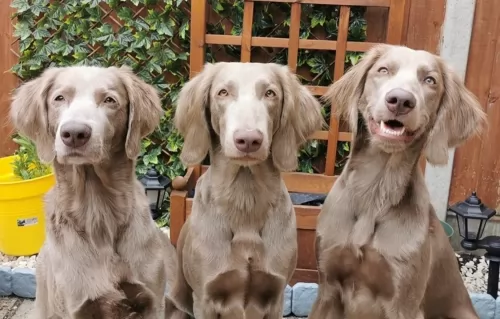 When you bring a Long Haired Weimaraner home, you will need to invest in brush and comb for his long hair. They’re active dogs and love nothing more than running in a field, rolling in mud and being very active.
When you bring a Long Haired Weimaraner home, you will need to invest in brush and comb for his long hair. They’re active dogs and love nothing more than running in a field, rolling in mud and being very active.
His coat will need to be brushed at least twice a week to keep it looking silvery and shimmering. Check the ears, eyes and teeth whenever you brush him and get used to cleaning his teeth regularly too.
If in doubt about how to keep your pet well groomed in terms of looks and health, speak to a dog expert, your vet or professional groomer.
Your ‘Gray Ghost’ dog has been a very successful hunting dog, and they are high-energy gun dogs. As a large dog he will have particular nutritional needs to fuel his energetic lifestyle.The dog’s high activity levels need to be taken into account when looking at his diet.
Buy the best commercially manufactured food. Add to his kibble some cooked chicken, brown rice or pasta and cooked or raw vegetables from time to time as well as bits of raw meat. Your dog will thank you for keeping his meals simple but nutritious.